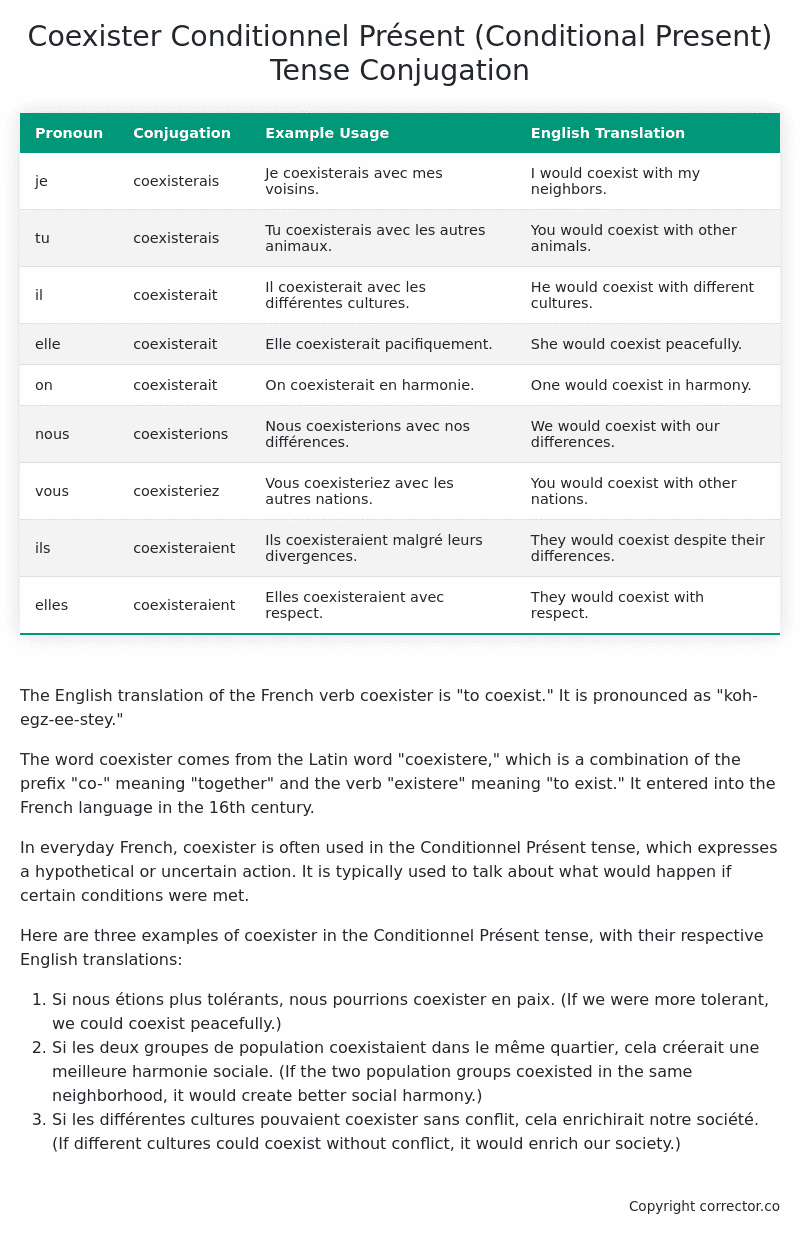Conditionnel Présent (Conditional Present) Tense Conjugation of the French Verb coexister
Introduction to the verb coexister
The English translation of the French verb coexister is “to coexist.” It is pronounced as “koh-egz-ee-stey.”
The word coexister comes from the Latin word “coexistere,” which is a combination of the prefix “co-” meaning “together” and the verb “existere” meaning “to exist.” It entered into the French language in the 16th century.
In everyday French, coexister is often used in the Conditionnel Présent tense, which expresses a hypothetical or uncertain action. It is typically used to talk about what would happen if certain conditions were met.
Here are three examples of coexister in the Conditionnel Présent tense, with their respective English translations:
- Si nous étions plus tolérants, nous pourrions coexister en paix.
(If we were more tolerant, we could coexist peacefully.) - Si les deux groupes de population coexistaient dans le même quartier, cela créerait une meilleure harmonie sociale.
(If the two population groups coexisted in the same neighborhood, it would create better social harmony.) - Si les différentes cultures pouvaient coexister sans conflit, cela enrichirait notre société.
(If different cultures could coexist without conflict, it would enrich our society.)
Table of the Conditionnel Présent (Conditional Present) Tense Conjugation of coexister
| Pronoun | Conjugation | Example Usage | English Translation |
|---|---|---|---|
| je | coexisterais | Je coexisterais avec mes voisins. | I would coexist with my neighbors. |
| tu | coexisterais | Tu coexisterais avec les autres animaux. | You would coexist with other animals. |
| il | coexisterait | Il coexisterait avec les différentes cultures. | He would coexist with different cultures. |
| elle | coexisterait | Elle coexisterait pacifiquement. | She would coexist peacefully. |
| on | coexisterait | On coexisterait en harmonie. | One would coexist in harmony. |
| nous | coexisterions | Nous coexisterions avec nos différences. | We would coexist with our differences. |
| vous | coexisteriez | Vous coexisteriez avec les autres nations. | You would coexist with other nations. |
| ils | coexisteraient | Ils coexisteraient malgré leurs divergences. | They would coexist despite their differences. |
| elles | coexisteraient | Elles coexisteraient avec respect. | They would coexist with respect. |
Other Conjugations for Coexister.
Le Present (Present Tense) Conjugation of the French Verb coexister
Imparfait (Imperfect) Tense Conjugation of the French Verb coexister
Passé Simple (Simple Past) Tense Conjugation of the French Verb coexister
Passé Composé (Present Perfect) Tense Conjugation of the French Verb coexister
Futur Simple (Simple Future) Tense Conjugation of the French Verb coexister
Futur Proche (Near Future) Tense Conjugation of the French Verb coexister
Plus-que-parfait (Pluperfect) Tense Conjugation of the French Verb coexister
Passé Antérieur (Past Anterior) Tense Conjugation of the French Verb coexister
Futur Antérieur (Future Anterior) Tense Conjugation of the French Verb coexister
Subjonctif Présent (Subjunctive Present) Tense Conjugation of the French Verb coexister
Subjonctif Passé (Subjunctive Past) Tense Conjugation of the French Verb coexister
Subjonctif Imparfait (Subjunctive Imperfect) Tense Conjugation of the French Verb coexister
Subjonctif Plus-que-parfait (Subjunctive Pluperfect) Tense Conjugation of the French Verb coexister
Conditionnel Présent (Conditional Present) Tense Conjugation of the French Verb coexister (this article)
Conditionnel Passé (Conditional Past) Tense Conjugation of the French Verb coexister
L’impératif Présent (Imperative Present) Tense Conjugation of the French Verb coexister
L’infinitif Présent (Infinitive Present) Tense Conjugation of the French Verb coexister
Struggling with French verbs or the language in general? Why not use our free French Grammar Checker – no registration required!
Get a FREE Download Study Sheet of this Conjugation 🔥
Simply right click the image below, click “save image” and get your free reference for the coexister Conditionnel Présent tense conjugation!

Coexister – About the French Conditionnel Présent (Conditional Present) Tense
Formation
Common Everyday Usage Patterns
Expressing Polite Requests
Expressing Hypothetical Situations
Expressing Doubt or Uncertainty
Interactions with Other Tenses
Present Tense
Past Tense
Future Tense
Conditional Perfect
Summary
Want More?
I hope you enjoyed this article on the verb coexister. Still in a learning mood? Check out another TOTALLY random French verb conjugation!


